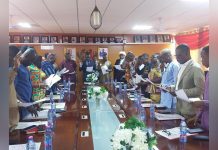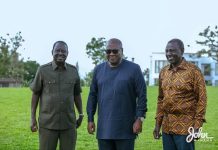Africa-Press – Ghana. The newsroom thrives on speed. A press release drops, a headline is drafted, a story goes live, and within hours, the cycle moves on to the next trending event. But what if journalism slowed down, not to lose its urgency, but to gain depth?
What if, instead of rushing from crisis to crisis, the media became the bridge that carried communities from uncertainty to trust, from suspicion to sustainable development?
That was the challenge Madam Adiki Ayitevie, Director and Principal Consultant of iFORA CommEX, threw to journalists at a two-day workshop organised by Nuclear Power Ghana (NPG) under the theme “Media Practices: A Bridge for Building a Sustainable Community Development.”
For Madam Ayitevi, whose experience with Newmont Ghana gave her rare insight into how big projects can either fracture or fortify communities, the media’s role extends beyond the printed page or broadcast waves.
“The media can build a better community through accountability and transparency,” she said, her voice both commanding and cautionary.
Beyond Breaking News: The Life Cycle of a Story
In her view, too much of Ghanaian journalism ends where the real story begins. A groundbreaking announcement makes headlines, but what happens after land is acquired, after farmers are displaced, after construction begins, or when promises are quietly shelved?
Madam Ayitevie challenged reporters to rise above “quick follow-ups and announcement coverage” and instead trace the full project life cycle, from acquisition to compensation, construction, operation, and even decommissioning. It is in this deeper investigation, she argued, that communities will find their questions answered and their fears addressed.
Navigating Power, Culture, and Identity
Development projects are never built on empty land; they are built on lives, cultures, and power structures. Madam Ayitevi did not mince words: NPG would face resistance not only from environmental concerns but from chiefs, youth, and cultural custodians whose authority and expectations could easily shift under the weight of a nuclear power project.
“When you come in as a company, you will change the social dynamics, you will change the power structure,” she explained.
“As you engage directly with communities and their youth, you dilute the power of the chiefs. Yet, the constitution requires you to deal with landowners through those same chiefs. That tension must be managed with sensitivity,” she cautioned.
Her advice to NPG was as practical as it was profound: train communities to manage compensation wisely, create employment opportunities beyond the plant itself, and prepare for the day when young graduates, armed with degrees and high expectations, demand jobs that cannot all be provided.
The Media as Interpreter, Not Just Messenger
Perhaps her sharpest reminder was to the journalists themselves: demystify the science. “Break down technical words like radiation for the ordinary person to understand. Demystify the myths surrounding nuclear power to avoid misinformation,” she urged.
For Madam Ayitevie, this is not optional; it is a civic duty. To communicate nuclear energy without explaining it in relatable terms would be to fuel the very fear that misinformation thrives on.
Regular facility visits, balanced reporting, and ongoing community engagement, she said, would build the trust needed to sustain such a project.
Guarding Against Sensationalism
Her call was reinforced by Mr Kofi Yeboah, a Communication Studies lecturer at Wisconsin and former General Secretary of the Ghana Journalists Association. He warned against sensationalism and unverified reporting, stressing that the media’s mandate is not only to inform but to promote dialogue, transparency, and national economic development.
He said the role of the media was not to undermine development but to ensure it is achieved responsibly and with accountability.
Lessons from Bui: Listening is Power
If theory needed proof, it came from the testimony of Mr Salifu, a representative of the Bui Power Authority.
He recounted how BPA built trust not by speeches but by sending officers to live among host communities, listening to concerns, and responding with action.
“Community people will expect a lot, and the difference is always how you communicate and listen,” he said.
Resettlement, he cautioned, must not only provide roofs and roads but restore livelihoods, preserve ancestral ties, and expand opportunities.
A New Model for Media and Development
Together, the voices at the workshop outlined a roadmap where media is not a passive observer but an active partner in shaping Ghana’s nuclear future.
It is a vision where headlines do not simply announce projects but sustain conversations, where journalists do not merely report crises but anticipate and prevent them.
Madam Ayitevie’s words lingered in the conference room long after her presentation ended: “The role of the media matters. Maintain balance, tell the facts, point out what is wrong so it can be corrected.”
As Ghana prepares to embark on one of its most ambitious energy projects yet, the question remains: will the media rise to this challenge, trading speed for substance, and sensationalism for sustainability?
The answer may determine not just how nuclear power is built, but how communities live with it for generations to come.
Source: Ghana News Agency
For More News And Analysis About Ghana Follow Africa-Press







